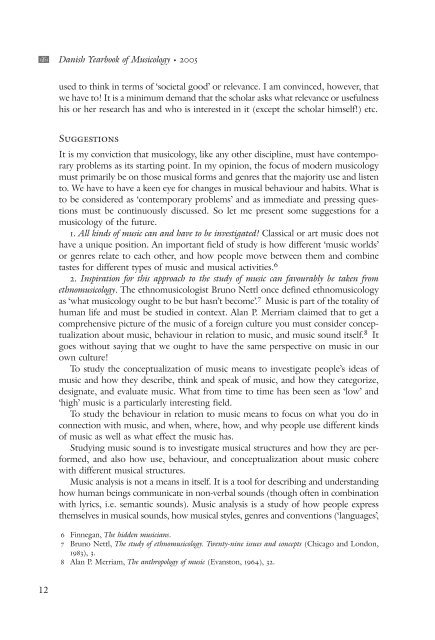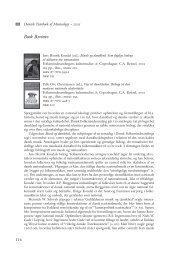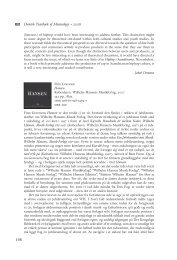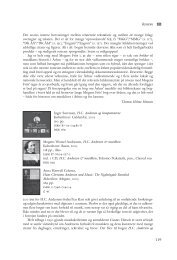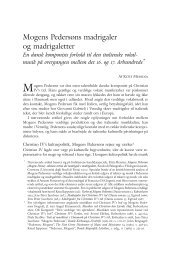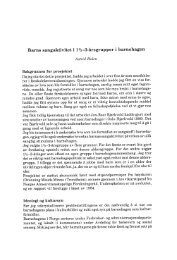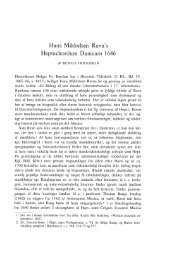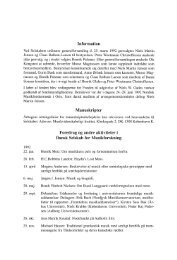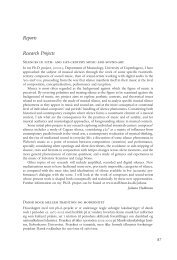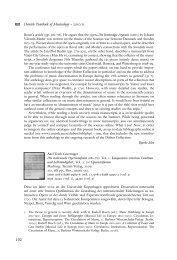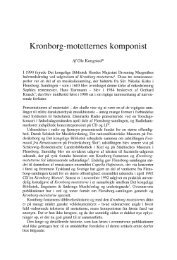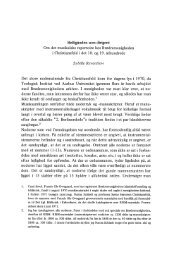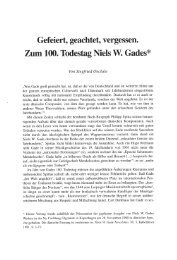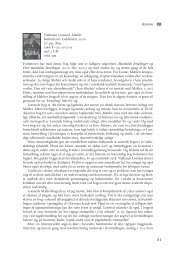Danish Yearbook of Musicology 33 ⢠2005 / Dansk årbog ... - dym.dk
Danish Yearbook of Musicology 33 ⢠2005 / Dansk årbog ... - dym.dk
Danish Yearbook of Musicology 33 ⢠2005 / Dansk årbog ... - dym.dk
You also want an ePaper? Increase the reach of your titles
YUMPU automatically turns print PDFs into web optimized ePapers that Google loves.
<strong>Danish</strong> <strong>Yearbook</strong> <strong>of</strong> <strong>Musicology</strong> • <strong>2005</strong><br />
used to think in terms <strong>of</strong> ‘societal good’ or relevance. I am convinced, however, that<br />
we have to! It is a minimum demand that the scholar asks what relevance or usefulness<br />
his or her research has and who is interested in it (except the scholar himself!) etc.<br />
Suggestions<br />
It is my conviction that musicology, like any other discipline, must have contemporary<br />
problems as its starting point. In my opinion, the focus <strong>of</strong> modern musicology<br />
must primarily be on those musical forms and genres that the majority use and listen<br />
to. We have to have a keen eye for changes in musical behaviour and habits. What is<br />
to be considered as ‘contemporary problems’ and as immediate and pressing questions<br />
must be continuously discussed. So let me present some suggestions for a<br />
musicology <strong>of</strong> the future.<br />
1. All kinds <strong>of</strong> music can and have to be investigated! Classical or art music does not<br />
have a unique position. An important field <strong>of</strong> study is how different ‘music worlds’<br />
or genres relate to each other, and how people move between them and combine<br />
tastes for different types <strong>of</strong> music and musical activities. 6<br />
2. Inspiration for this approach to the study <strong>of</strong> music can favourably be taken from<br />
ethnomusicology. The ethnomusicologist Bruno Nettl once defined ethnomusicology<br />
as ‘what musicology ought to be but hasn’t become’. 7 Music is part <strong>of</strong> the totality <strong>of</strong><br />
human life and must be studied in context. Alan P. Merriam claimed that to get a<br />
comprehensive picture <strong>of</strong> the music <strong>of</strong> a foreign culture you must consider conceptualization<br />
about music, behaviour in relation to music, and music sound itself. 8 It<br />
goes without saying that we ought to have the same perspective on music in our<br />
own culture!<br />
To study the conceptualization <strong>of</strong> music means to investigate people’s ideas <strong>of</strong><br />
music and how they describe, think and speak <strong>of</strong> music, and how they categorize,<br />
designate, and evaluate music. What from time to time has been seen as ‘low’ and<br />
‘high’ music is a particularly interesting field.<br />
To study the behaviour in relation to music means to focus on what you do in<br />
connection with music, and when, where, how, and why people use different kinds<br />
<strong>of</strong> music as well as what effect the music has.<br />
Studying music sound is to investigate musical structures and how they are performed,<br />
and also how use, behaviour, and conceptualization about music cohere<br />
with different musical structures.<br />
Music analysis is not a means in itself. It is a tool for describing and understanding<br />
how human beings communicate in non-verbal sounds (though <strong>of</strong>ten in combination<br />
with lyrics, i.e. semantic sounds). Music analysis is a study <strong>of</strong> how people express<br />
themselves in musical sounds, how musical styles, genres and conventions (‘languages’,<br />
6 Finnegan, The hidden musicians.<br />
7 Bruno Nettl, The study <strong>of</strong> ethnomusicology. Twenty-nine issues and concepts (Chicago and London,<br />
1983), 3.<br />
8 Alan P. Merriam, The anthropology <strong>of</strong> music (Evanston, 1964), 32.<br />
12


